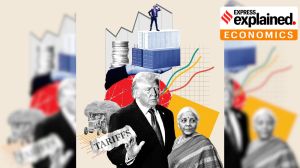Thousand-year madness
Be warned, the scourge of 1999, millennial madness, is upon us and it is highly contagious. Indeed, as 1998 ticked away, the symptoms wer...

Be warned, the scourge of 1999, millennial madness, is upon us and it is highly contagious. Indeed, as 1998 ticked away, the symptoms were already evident with age-old comfort rituals like new year resolutions being swept away by more weighty deliberations over which island would catch the first sunrays of 2000 and whether the Y2K computer glitch could actually signal the end of history.
Now as we cross the bridge into the 21st century, there is bound to be an information overload on the centuries past and those ahead as chroniclers of every hue chart the ups and downs of the last thousand years; some will labour meticulously over archival minutiae while others telescope the years into grand ideological schemes. But what is beyond doubt is that everyone will have an opinion as millennial madness nudges the nineties8217; consciousness out of its permanent present and opens the floodgates of memory and imagination.
Through it all, purists will continue to quibble that the millennium does not technically begintill January 1, 2001 8212; a rational claim which has been summarily brushed aside because a the fin de siecle has the makings of the marketing event of all time, so why leave for next year the moolah you can mop up 365 days from now; b a 999-year millennium is a small price to pay for an aesthetically beguiling milestone; and c if the millennium bug is to strike in the year 2000, how could the millennium itself start a whole year later?
In fact, the computer bug, or more precisely Y2K phobia, will be the defining motif in this hopelessly surreal year. No matter how emphatically apprehensions of a software meltdown are denied, an increasing number of people, most of them surprisingly Netizens, are convinced that computers around the world will usher in the next millennium as the year 1900 since they only register the last two digits of a year.
And back to the last century it will be for our delicately wired world, they aver, with planes nosediving midflight, power outages resulting in prolongedblackouts and food distribution systems thrown off kilter. So, they are stockpiling 8212; candles, firewood, processed food, tea bags, water purifying pills, toilet paper, comic books. And, of course, hard cash, though doomwatchers fear that with the global banking system likely to be in a near-certain tizzy, it would be more pragmatic to prepare for a return to the barter system.
If this hysteria seems a trifle obsessive, it is not without precedent. Natural historian Stephen Jay Gould says research has clearly affirmed 8220;the angst that always accompanies the ending of centuries8221;, including a 8220;panic terror8221; that swept Europe around 1000 AD. This time around, with the attendant uncertainties of the nuclear age and a relentless population implosion just think, the global headcount was 300 million in 1000, 1.7 billion in 1900 and will be an estimated 6.1 billion in 2000, faith in humanity8217;s inexorable progress is predictably even harder to muster.
Having said that, there is a definite zing to the yearahead. It is a rare opportunity to offload excess baggage by projecting niggling personal foibles and anxieties on to our times and situating ourselves more securely in history. Besides, who can deny the thrill of succumbing to countdown mania and sifting through the centuries 8212; though most of us will limit ourselves to decades 8212; to spin idiosyncratic narratives about the journey so far, about the foggy road ahead. Most importantly, 1999 will accord us the freedom to toss aside the postmodern tenet of political correctness and debate and argue as we pass sweeping judgements. Here8217;s to a delightfully contentious year!
- 01
- 02
- 03
- 04
- 05































